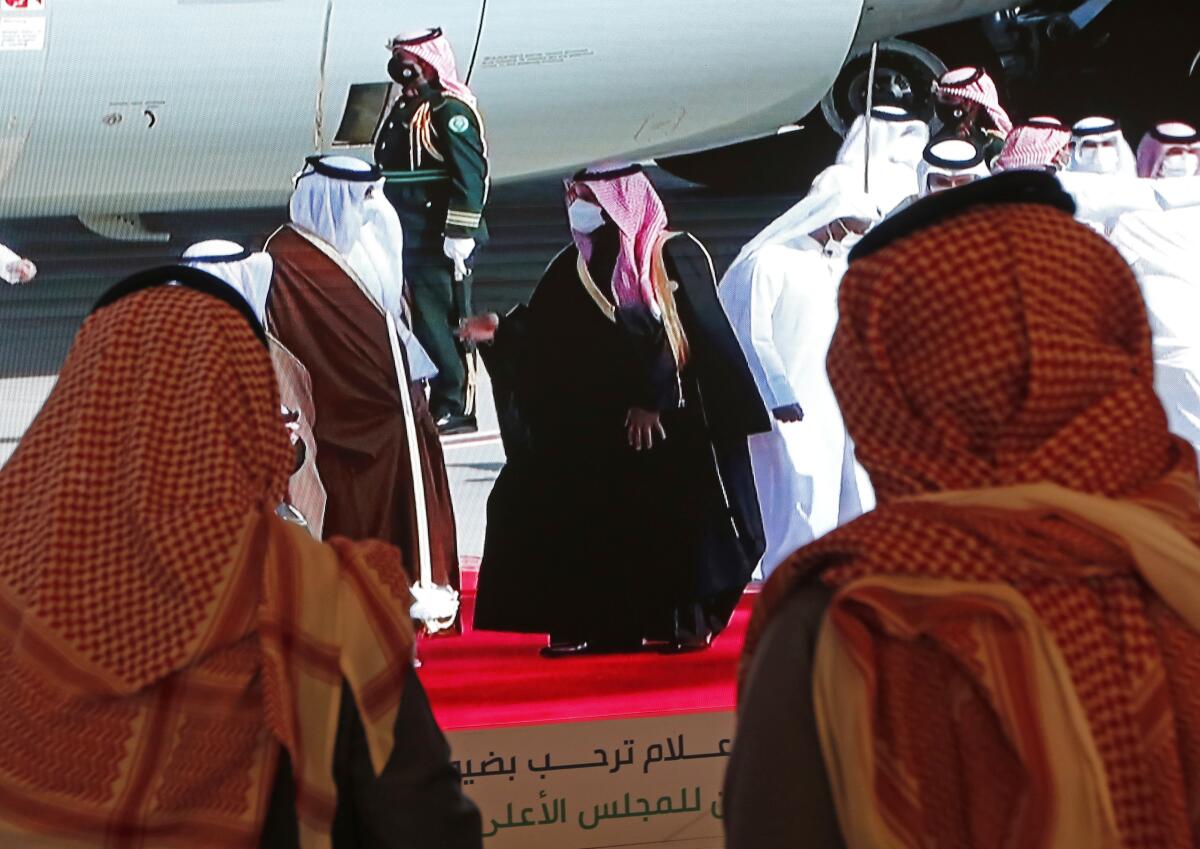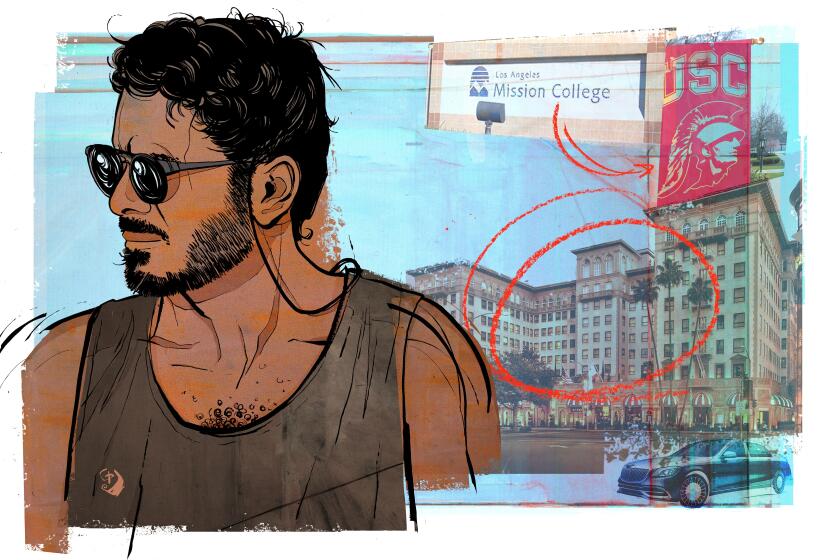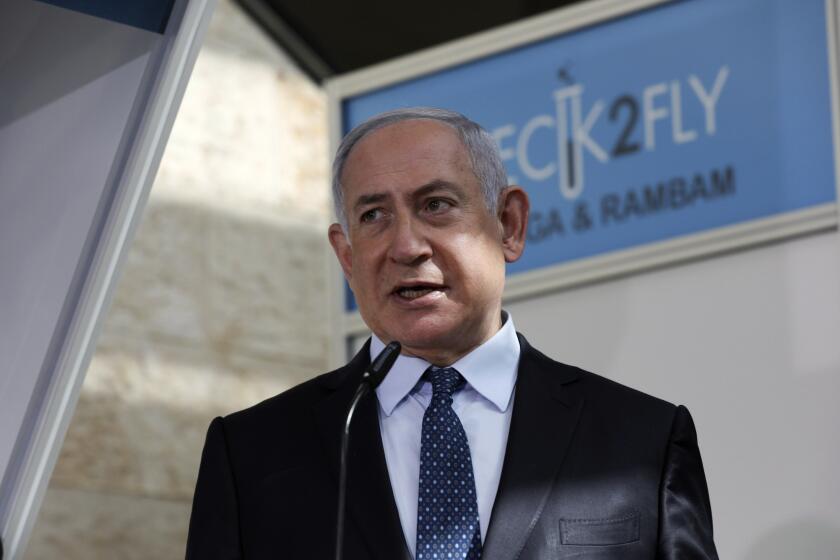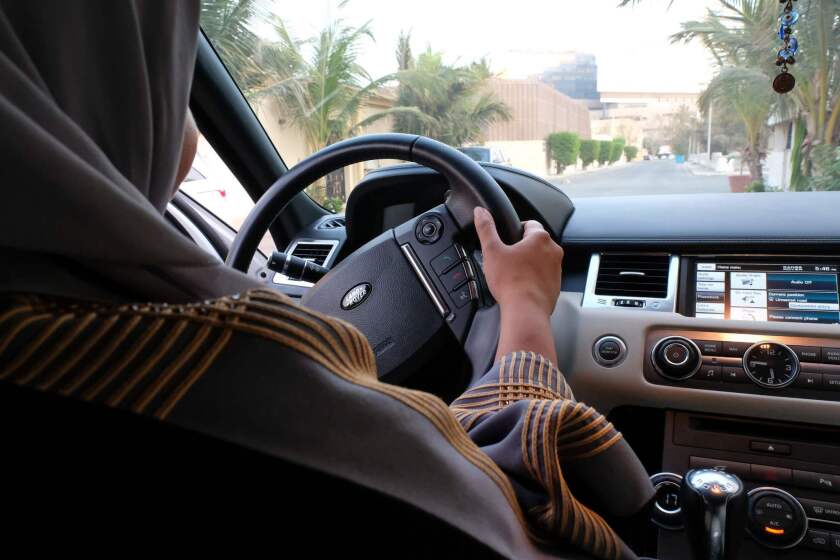Arab Gulf leaders sign declaration with Qatar to ease their long-running rift

AL ULA, Saudi Arabia — Leaders of Arab Gulf states signed a declaration Tuesday marking a new chapter in their relations following Saudi Arabia’s decision to end a 3½-year embargo of Qatar, easing a rift that deeply divided regional U.S. security allies and frayed social ties across the interconnected Arabian Peninsula.
The Saudi decision to open its airspace and borders to Qatar was the first major step toward ending the diplomatic crisis that began in 2017, just as the Trump administration was raising pressure on Iran. Saudi Arabia, Bahrain, Egypt and the United Arab Emirates boycotted Qatar and cut transport and diplomatic links over Doha’s support for Islamist groups and warm ties with Iran.
The Saudi move to end the blockade was announced Monday night, on the eve of the gathering of Gulf leaders in Saudi Arabia’s ancient desert city of Al Ula. The arrival of Qatar’s Sheik Tamim bin Hamad Al Thani in Al Ula for the summit Tuesday was broadcast live on Saudi TV. He was seen descending from his plane and being greeted with a hug by Saudi Crown Prince Mohammed bin Salman.
The prince said later that the region needed to unite and face challenges posed by Iran’s proxies and its nuclear and ballistic missile programs. He said the declaration signed by Gulf leaders and Egypt “emphasizes Arab and Gulf solidarity and stability, and reinforces the continuity of friendship and brotherhood between our countries.”
The diplomatic breakthrough comes after a final push by the outgoing Trump administration and fellow Gulf state Kuwait to bring an end to the crisis. It wasn’t until late Monday — on the eve of the summit and just ahead of President-elect Joe Biden’s swearing-in — that the major step to ending the spat was announced.
The timing was auspicious: Saudi Arabia may be seeking both to grant the Trump administration a final diplomatic win and to remove obstacles to building warm ties with the Biden administration, which is expected to take a firmer stance toward the oil-rich kingdom.
When a Qatari sheikh came to live in L.A., an entire economy sprouted to meet his wishes. “His highness doesn’t like to hear no,” one associate told a professor.
Qatar’s only land border has been mostly closed since June 2017, when the other Arab states’ boycott of the small but influential Persian Gulf nation began. The Saudi border, which Qatar relied on for the import of dairy products, construction materials and other goods, opened briefly during the past three years to allow Qataris into Saudi Arabia to perform the Islamic hajj pilgrimage.
It was unclear what concessions Qatar might have made in its policies to spur the rapprochement. The boycott largely failed to change Doha’s regional posture, instead buoying Sheik Tamim domestically as patriotic fervor swept through Qatar in support of his resolve.
The Qatari emir has attended the Gulf Cooperation Council summit only once since the four-nation boycott began, when the meeting was hosted by Kuwait. He sent an envoy to the following two summits, which were held in Saudi Arabia.
Although the Saudi decision to open its airspace, land and sea borders with Qatar is an important step in resolving the spat, full reconciliation is far from guaranteed. The rift between the UAE and Qatar, over ideological differences, has been the deepest.
Israeli media report that Prime Minister Benjamin Netanyahu flew to Saudi Arabia for a clandestine meeting with Crown Prince Mohammed bin Salman.
UAE Minister of State for Foreign Affairs Anwar Gargash tweeted late Monday that his country was keen to restore Gulf unity but cautioned: “We have more work to do.”
The meeting in Al Ula would traditionally be chaired by Saudi King Salman, but his son and heir, the crown prince, may lead it instead.
This year, Egypt’s foreign minister is also attending the summit of the six-nation Gulf Cooperation Council, which comprises Saudi Arabia, the UAE, Bahrain, Kuwait, Oman and Qatar.
The Saudi move toward reconciliation with Qatar came just weeks after President Trump’s advisor and son-in-law, Jared Kushner, visited the kingdom and Qatar to try to bring an end to the rift. Kushner has reportedly been invited to attend the signing ceremony in Al Ula.
The Saudi crown’s new adversary is a coronavirus not subject to the whims of a brazen desert ruler.
This is the first GCC summit since the UAE, Bahrain, Sudan and Morocco announced in rapid succession they would normalize ties with Israel, marking a major shift in regional alliances. It is also the first since the longtime leaders of both Oman and Kuwait died, ushering in a new crop of hereditary rulers. The youngest royals at the summit are Sheik Tamim, 40, and Crown Prince Mohammed, 35.
Saudi Arabia’s decision to end the embargo not only underscores the kingdom’s assertion of its heavyweight position among Arab states but also its regional leadership, which has been at times challenged by the UAE’s unilateral and politically shrewd moves.
Normalization with Qatar could buy Saudi Arabia time to strike compromises with the Biden administration on other issues, such as the kingdom’s war in Yemen and potential U.S. reengagement with Iran, said Samuel Ramani, a nonresident fellow at the Gulf International Forum.
Breaking News
Get breaking news, investigations, analysis and more signature journalism from the Los Angeles Times in your inbox.
You may occasionally receive promotional content from the Los Angeles Times.
At issue are concerns that Qatar’s close relations with Turkey and Iran have undermined regional security. Egypt and the UAE view Qatar and Turkey’s support of the Muslim Brotherhood as a security threat and have deemed the group a terrorist organization. Saudi Arabia and Bahrain are primarily concerned with Qatar’s close ties with regional foe Iran.
Those simmering tensions came to a boil in the summer of 2017, when the four countries announced their boycott of Qatar and cut all transportation and diplomatic links with it. The move separated families whose members had married Qataris and ended years of visa-free travel for Qataris in parts of the Gulf. It also pushed Qatar diplomatically closer to Turkey and Iran, which both rushed to Doha’s aid with food and medical supplies in the first days of the embargo.
Gas-rich Qatar also took an economic hit from the boycott, and its national airline, denied airspace over the boycotting countries, was forced to fly longer, more costly routes. It was unclear how the embargo would impact its ability to host the 2022 FIFA World Cup.
The boycotting countries made a list of demands on Qatar that included shuttering its flagship Al Jazeera news network and terminating Turkish military presence in Qatar, which is also home to a major U.S. military base. Qatar has rejected the demands and denied support of extremists.
One of Saudi Arabia’s most prominent women’s rights activists has been sentenced to nearly six years in prison under a broadly worded terrorism law.
State-linked media in the UAE and Qatar lobbed vicious attacks back and forth. Qataris also suggested that the UAE was behind the hacking of its state-run news agency in 2017, while the UAE’s influential ambassador to Washington saw his emails subsequently hacked and leaked.
In a sign that hostilities continue to simmer, Qatar protested to the U.N. Security Council last month that Bahraini fighter jets “violated” Qatari airspace in early December. Bahrain has accused the Qatari coast guard of arbitrarily detaining dozens of Bahraini fishing vessels.
Ahmed Hafez, the spokesman for Egypt’s Foreign Ministry, said last week that Cairo supported efforts to reach a resolution that respected “non-interference in internal affairs,” an apparent reference to Qatar’s backing of the Muslim Brotherhood.
The conflict in Libya is also a contentious issue, with Egypt and the UAE supporting militias fighting a Tripoli-based bloc backed by Turkey and Qatar.
More to Read
Sign up for Essential California
The most important California stories and recommendations in your inbox every morning.
You may occasionally receive promotional content from the Los Angeles Times.













